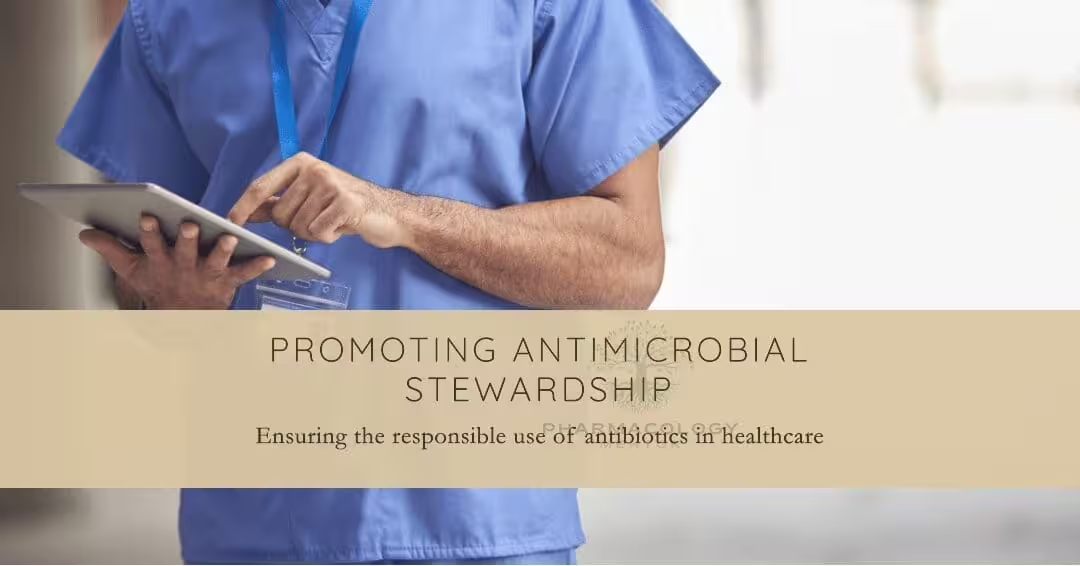1. Introduction and Scope
Antimicrobial stewardship (AMS) is a coordinated set of interventions aimed at optimizing the use of antimicrobial agents—including antibiotics, antivirals, antifungals, and antiparasitics—to ensure optimal clinical outcomes, minimize toxicity, reduce the development of resistance, and limit unnecessary costs. AMS operates at the intersection of microbiology, infectious diseases, pharmacology, epidemiology, and public health.
- Goal: Right drug, right dose, right duration, right route, for the right infection.
2. Rationale and Importance
- Antimicrobial resistance (AMR) ranks as a critical global health threat. AMR threatens all domains of medicine: routine surgery, cancer chemotherapy, and chronic disease management require effective antimicrobials.
- AMS reduces unnecessary exposure, promotes pathogen-appropriate therapy, curtails adverse events, and maintains the efficacy of available agents.
Clinical Implications:
- Inappropriate antimicrobial use leads to selection of multidrug-resistant organisms (MDROs), increased rates of Clostridioides difficile infection, worse patient outcomes, and higher healthcare costs.
- AMS is endorsed by WHO, CDC, IDSA, and major global health organizations.
3. Key Components of AMS Programs
| Component | Description |
|---|---|
| Leadership | Multidisciplinary teams (Infectious Diseases, Pharmacy, Microbiology, IT, Administration) |
| Guidance | Evidence-based treatment guidelines, formulary restriction, pre-authorization of certain drugs |
| Education | Ongoing training for prescribers, nurses, and patients |
| Audit & Feedback | Regular review of antimicrobial prescribing patterns, feedback to clinicians |
| Surveillance | Monitoring antimicrobial utilization and resistance patterns |
| Interventions | Prospective audit with intervention and feedback; dose optimization; streamlining/de-escalation |
| Technology | Clinical decision support systems, electronic prescribing, rapid diagnostics |
4. AMS Strategies in Practice
- Empirical Therapy: Start broad when necessary, then tailor (de-escalate) based on culture results and clinical evolution.
- Definitive Therapy: Shift to narrow-spectrum agents once pathogen identified.
- Duration Reduction: Shorter courses validated for many common syndromes (e.g., UTI, CAP, SSTI).
- IV to PO Conversion: Transition to oral therapy when clinically appropriate.
- Dose Optimization: Renal function, site of infection, pharmacokinetics/dynamics considered.
5. AMS in the Era of COVID-19
- COVID-19 Impact: The pandemic disrupted AMS activities, led to increased empirical antibiotic use—even for viral infections—resulting in escalation of resistance, especially in critical care settings.
- Opportunities: Innovation in telemedicine, remote stewardship, rapid diagnostics, and expanded education platforms.
- Key Issue: Explosive spread of resistant pathogens such as carbapenem-resistant Pseudomonas aeruginosa and Candida auris reported in ICUs managing COVID-19 patients.
6. Barriers and Solutions
Low- and Middle-Income Countries (LMICs):
- Challenges: Limited access to advanced diagnostics, drug shortages, weak surveillance, lack of local guidelines, low trust in laboratory data.
- Solutions: Building laboratory infrastructure, localized guideline development, regular education, and stewardship program adaptation to local needs.
Behavioral Barriers:
- Prescriber autonomy, patient demand, cultural attitudes to antibiotics, information gaps.
7. Special Populations: Solid Organ Transplant Recipients
- Unique Risks: Profound immunosuppression, frequent broad-spectrum exposure, device-associated infections.
- Stewardship Principles: Individual risk stratification (type of organ, time since transplant, comorbidities), personalized regimens, vigilant monitoring for MDROs, and coordinated multidisciplinary management.
8. Global Responsibility and Future Directions
- Expansion: AMS must be globally integrated, not limited to high-resource centers. Collaboration between countries, harmonized surveillance, and sharing of best practices is critical.
- Research: Genomics, rapid diagnostics (e.g., PCR-based panels), artificial intelligence in decision support, and novel drug development.
- Behavioral Science: Promoting culture change among prescribers and patients.
9. Clinical Case Example Table
| Case | AMS Action | Outcome |
|---|---|---|
| Community pneumonia | Empiric β-lactam/macrolide → narrowed to penicillin after culture | Reduced exposure, minimized resistance |
| ICU patient with fever | Empiric carbapenem → de-escalated to cefepime post-ESBL-negative report | Limited MDRO risk, cost containment |
| Kidney transplant | Individualized prophylaxis, strict monitoring | Decreased opportunistic infections, fewer adverse drug events |
10. Key Summary and Take-Home Points
- AMS is essential for protecting the longevity of antimicrobial efficacy.
- Implementation relies on organizational support, continual education, audit, and adaptation to local context.
- COVID-19 highlighted weaknesses and opportunities—digital solutions and diagnostic advances are the future.
- Solid organ transplant patients require individualized stewardship.
- Barriers exist globally; solutions must be context-sensitive and sustainable.
References and Recommended Reading
- World Health Organization. Global Action Plan on Antimicrobial Resistance.
- Goodman & Gilman’s The Pharmacological Basis of Therapeutics, 13th Ed. (Chapter: Antimicrobial Chemotherapy; AMS).
- Infectious Diseases Society of America guidelines on AMS.
📚 AI Pharma Quiz Generator
🎉 Quiz Results
Medical Disclaimer
The medical information on this post is for general educational purposes only and is provided by Pharmacology Mentor. While we strive to keep content current and accurate, Pharmacology Mentor makes no representations or warranties, express or implied, regarding the completeness, accuracy, reliability, suitability, or availability of the post, the website, or any information, products, services, or related graphics for any purpose. This content is not a substitute for professional medical advice, diagnosis, or treatment; always seek the advice of your physician or other qualified health provider with any questions you may have regarding a medical condition and never disregard or delay seeking professional advice because of something you have read here. Reliance on any information provided is solely at your own risk.

